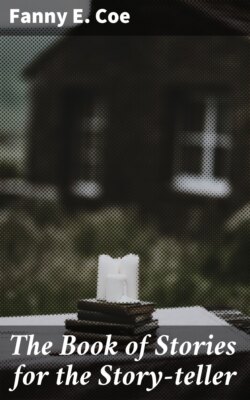Читать книгу The Book of Stories for the Story-teller - Fanny E. Coe - Страница 15
На сайте Литреса книга снята с продажи.
How the Robin Came [4]
ОглавлениеTable of Contents
ong ago, as you know, the Indians roved over the plains and through the forests of America. Their leaders were called chiefs. This story tells about an Indian chief and his son.
[4] This story is based upon a legend of the Algonquin Indians. John Greenleaf Whittier has a poem with a similar title, written upon the same theme.
The Indian chief was very strong and very brave. He could bear cold, hunger and pain without a word. He was a wonderful hunter and a fierce enemy. Nothing ever made him afraid.
He had one son, whom he loved with all his heart. He hoped that this son would grow up to be a warrior, greater than his father.
But the lad was slender and white-faced. He did not seem strong; long marches wearied him. When the Indian boys are about eighteen years of age, they like to show that they will make brave warriors. To do this they take certain tests. These are some of them. They go without food and water, five, seven, or even ten days. Again they go without sleep for ten days. They let their friends cut them with knives and never even cry out.
The time came when the son of the chief must take the test. He went away to the wigwam, or lodge, where the testing took place. His father hoped that he would act like a brave young man.
When some days had passed, the father went to see his son. Pale and weak, he lay on the ground. He had not eaten nor slept.
"Father," he whispered, "I cannot bear this. Let me go free."
"Ah no, my boy," said the chief. "They will call you woman, if you fail. It is but two days more. Then you shall have good meat and deep sleep. Think of the time when you will be a great chief, with a hundred scalps at your belt. Be strong."
But the lad only shook his head.
Two days later, the father rose with the sun. He heaped moose-meat and corn into a wooden bowl and set off to his son.
As he drew near the wigwam he called, "Here is food, my son."
There was no reply.
He entered, and there, on the ground before him, lay his boy, dead.
They dug his grave close by the lodge, and brought his bow, pipe, and knife to bury with him.
As they were placing the youth in his grave, they heard a strange, new song. They looked up and saw, on the top of the lodge, an unknown bird. It had a brown coat and a red breast. As they watched, it began to sing. Its song seemed to say:
"I was once the chief's son. But now I am a bird. I am happier than if I had lived to be a fierce warrior, with scalps at my belt. Now I shall make all glad with my song. I shall tell the little children when spring has come. Then they will search for pussy-willows and anemones. I am the robin, a little brother to man! Who so happy as I?"
Even the father's grief was comforted by the bright little messenger. "It is best after all," he said. "My son could not kill men nor beasts; he is happier as a singer, even as this little bird."
